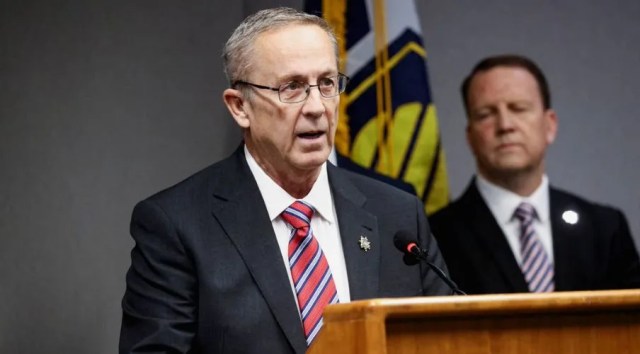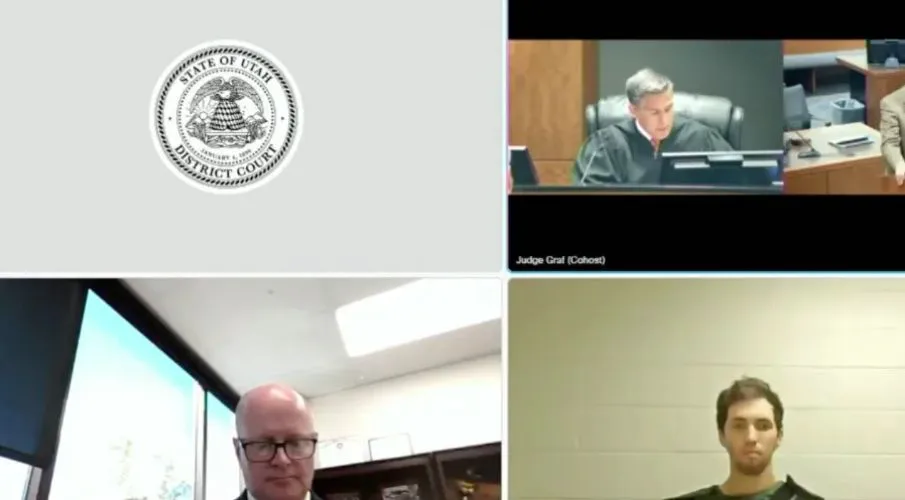Es war ein nüchterner Rahmen für ein Ereignis, das in seiner Tragweite längst die Grenzen von Utah überschritten hat: Im vierten Distriktgericht von Provo, Utah County, fand am Dienstag die erste Anhörung im Fall State of Utah v. Tyler James Robinson statt. Der 22-Jährige, dem vorgeworfen wird, den extrem rechtskonservativen Aktivisten Charlie Kirk auf dem Campus der Utah Valley University erschossen zu haben, wurde per Videoschaltung aus der Haftanstalt zugeschaltet. Bei der kurzen Videoschalte machte Robinson selbst keine Angaben zur Sache.
Der Richter beschränkte sich darauf, die Anklagepunkte zu verlesen und den weiteren Ablauf des Verfahrens zu skizzieren. Bis zur Bestellung eines Verteidigers bleibt Robinson ohne rechtliche Vertretung in Untersuchungshaft. Der zuständige Staatsanwalt Jeff Gray verlas die Anklagepunkte: „Aggravated Murder“ (Mord mit besonderer Schwere), „Felony Discharge of a Firearm“ (schweres Entladen einer Schusswaffe mit Verletzungsfolge) und „Obstruction of Justice“ (Behinderung der Justiz). Das Verfahren läuft unter der OTN-Nummer 70090584.

The prosecution made clear that this is a capital crime with the death penalty on the table. Gray spoke of an “American tragedy” and presented a series of pieces of evidence said to directly link Robinson to the crime. DNA traces “consistent with Robinson” were secured on the trigger of the bolt-action rifle, on other parts of the weapon, on a fired cartridge casing as well as on two of the three unfired cartridges. Investigators also found corresponding traces on a towel in which the rifle had been wrapped. In addition, investigators listed clothing items as evidence that Robinson is said to have discarded and hidden after the crime. A note secured by investigators, found under a keyboard in his apartment, contained the sentence: “I had the opportunity to take out Charlie Kirk and I’m going to take it.” These clues are supplemented by text messages to his roommate and partner, in which Robinson admitted his involvement and explained he had “had enough of Kirk’s hatred.”

This dialogue, written shortly after the murder, marks the rupture between two young men - and reads like the incredible transcript of a self-exposure.
Robinson: “I am still ok my love, but am stuck in Orem for a little while longer yet. Shouldn’t be long until I can come home, but I gotta grab my rifle still. To be honest I had hoped to keep this secret till I died of old age. I am sorry to involve you.”
Roommate: “You weren’t the one who did it, right????”
Robinson: “I am, I’m sorry.”
Roommate: “I thought they caught the person?”
Robinson: “No, they grabbed some crazy old dude, then interrogated someone in similar clothing. I had planned to grab my rifle from my drop point shortly after, but most of that side of town got locked down. It’s quiet, almost enough to get out, but one vehicle is still lingering.”
Roommate: “Why?”
Robinson: “Why I did it?”
Roommate: “Yeah.”
Robinson: “I had enough of his hatred. Some hate can’t be negotiated out. If I am able to grab my rifle unseen, I will have left no evidence. I will try to retrieve it again, hopefully they have moved on. I haven’t seen anything about them finding it.”
…
Roommate: “How long have you been planning this?”
Robinson: “A bit over a week I believe. I can get close to it but there is a squad car parked right by it. I think they already swept that spot, but I don’t wanna chance it.”
…
Robinson: “I’m wishing I had circled back and grabbed it as soon as I got to my vehicle. … I’m worried what my old man would do if I didn’t bring back grandpa’s rifle … no idea if it had a serial number, but it wouldn’t trace to me. I worry about prints I had to leave it in a bush where I changed outfits. I didn’t have the ability or time to bring it with. … I might have to abandon it and hope they don’t find prints. How the fuck will I explain losing it to my old man …”
The words are disturbing in their coldness, at the same time almost casual in their intimacy. Between the urge to make evidence disappear and the fear of having to give an account to his own father, the abyss of a crime opens up that has shaken the country.

Robinson, born in 2003, raised in St. George, son of Republican parents, was once part of the conservative milieu before, according to his family, moving politically to the left in recent years. Investigators speak of radicalization in “dark corners of the internet.” He himself wrote about Kirk: “I had enough of his hatred. Some hate can’t be negotiated out.” After the crime Robinson discarded the rifle and clothing, he asked his roommate to make evidence disappear. He himself stayed in the area, did not drive far - and was arrested two days later near St. George. Crucial was the tip from his family, who recognized the wanted photo on television and persuaded their son to return.

The prosecution also presented ammunition on whose cartridges Robinson had engraved messages - from sneering slogans to mockery of political opponents. It appears like an attempt to turn the crime into a game that in the end culminated in deadly reality. The course of the murder is now clearly outlined: On September 10 Charlie Kirk was speaking in the courtyard of Utah Valley University before students, when Robinson opened fire from the roof of the Losee Center with a bolt-action rifle. The shot struck Kirk in the neck, he died shortly afterward in the hospital. A university officer who was monitoring the crowd from an elevated position quickly identified the shooter’s post. Investigators immediately found traces there that led to Robinson. That the defendant was now connected by video link from the detention facility was also an expression of caution: The security situation, which had already been criticized on the night of the crime, continues to shape the handling of this trial. Prosecutor Jeff Gray also read out at the hearing a message from Robinson evaluated by investigators. In it Robinson described the engravings on the cartridges as “mostly just a meme.” Literally he wrote: “If I see ‘notices bulge OwO’ on Fox News, I’m going to have a stroke, alright.” With this Robinson questioned the public interpretation of the inscriptions as ideological messages.

Robinson’s mother explained that over the past year or so Robinson had become more political and had started to lean more to the left — becoming more pro-gay and trans-rights oriented. She stated that Robinson began to date his roommate, a biological male who was transitioning. This resulted in several discussions with family members, but especially between Robinson and his father, who have very different political views. In one conversation before the shooting, Robinson mentioned that Charlie Kirk would be holding an event at UVU, which Robinson said was a “stupid venue” for the event. Robinson accused Kirk of spreading hate.
Robinson’s father reported that when his wife showed him the surveillance image of the suspected shooter in the news, he agreed that it looked like their son. He also believed that the rifle police suspected was used matched a rifle that he had given his son as a gift. As a result, Robinson’s father contacted his son and asked him to send a photo of the rifle. Robinson did not respond. However, Robinson’s father spoke on the phone with Robinson. Robinson implied that he planned to take his own life. Robinson’s parents were able to convince him to meet at their home.
As they discussed the situation, Robinson implied that he was the shooter and stated that he couldn’t go to jail and just wanted to end it. When asked why he did it, Robinson explained there is too much evil and the guy [Charlie Kirk] spreads too much hate. They talked about Robinson turning himself in and convinced Robinson to speak with a family friend who is a retired deputy sheriff. At Robinson’s father’s request, the family friend met with Robinson and his parents and convinced Robinson to turn himself in.
The legal dimension is clear: “Aggravated Murder” makes the case one of the rare trials in Utah where the death penalty is seriously considered. At the same time the societal questions remain open: How could a young man from a conservative family background become a political assassin? What role did the internet, personal conflicts, political polarization play? And how does a country deal with it when its own democracy has become an arena of deadly enmities?
See also our article: “The Distorted Truths of Tyler Robinson and Messages from Hell,” at the link: https://kaizen-blog.org/en/die-verzerrten-wahrheiten-um-tyler-robinson-und-nachrichten-aus-der-hoelle/
At the end of the hearing prosecutor Jeff Gray made clear that this will not be a case that disappears in legal details: “The murder of Charlie Kirk is an American tragedy.” Words that weighed heavily in the room - heavier still than the image of the defendant, who with a serious face was connected from afar into the courtroom.
Investigative journalism requires courage, conviction – and your support.
Please support our journalistic fight against right-wing populism and human rights violations. We do not want to finance our work through a paywall, so that everyone can read our investigations – regardless of income or background.

Es wird zur Todesstrafe führen.
Wenn ich sehe, was der Tod von Kirk ausgelöst hat, ist das die einzige und traurige Folge.
Nur am Rande …. es hat keiner die Todesstrafe für den Mörder von Melissa Hortman und ihrem Mann gefordert …..
So heuchlerisch ist MAGA
👍